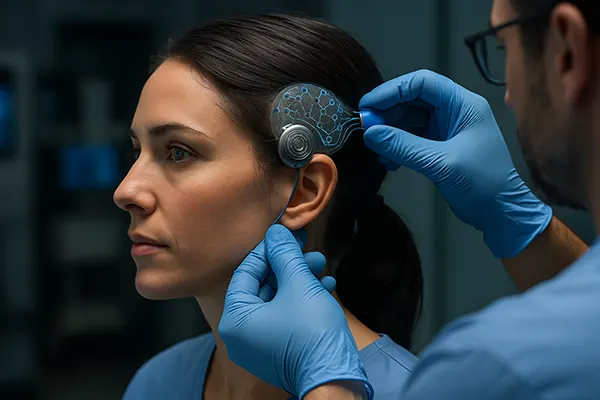In recent years, neuroscience has taken an extraordinary leap forward with the emergence of neural implants—technologies designed to interact directly with the brain to treat a wide range of neurological and psychiatric conditions. Among the most promising frontiers is the application of these implants in the treatment of mental health disorders, such as depression, PTSD, OCD, and anxiety. With key clinical trials and regulatory momentum accelerating globally, 2025 could mark a turning point in how we understand and manage mental health through precise brain modulation.
Advances in Neurotechnology: From Theory to Clinical Trials
Neural implants work by delivering targeted electrical stimulation to specific areas of the brain involved in emotional regulation and cognitive function. Deep brain stimulation (DBS), a technique traditionally used to treat Parkinson’s disease, has found a new role in psychiatry. Devices like the Medtronic Percept PC and Boston Scientific’s Vercise system are now being tested for treatment-resistant depression and obsessive-compulsive disorder.
In February 2025, the U.S. FDA granted Breakthrough Device Designation to several next-generation brain-computer interface (BCI) systems aimed at mental health intervention. These include precision-targeted implants that adapt in real time to the brain’s bioelectrical signals, offering personalisation in treatment approaches. Europe and the UK are similarly advancing through fast-track ethical reviews for neurotech applications in psychiatry.
One particularly significant trial published in January 2025 in *The Lancet Psychiatry* demonstrated a 60% reduction in symptoms among patients with major depressive disorder who received adaptive neurostimulation. The results highlight not only the therapeutic potential but also the critical importance of real-time feedback loops between implants and neural activity.
Scientific Foundations and Ethical Frameworks
The theoretical basis for neural implants in psychiatry lies in the network model of the brain, where mental disorders are viewed as dysfunctions in circuit connectivity rather than isolated chemical imbalances. Technologies like closed-loop DBS and optogenetics target these dysfunctional networks with unprecedented specificity.
However, with great power comes the ethical burden of responsible deployment. Concerns around autonomy, identity alteration, and long-term cognitive effects are being addressed through international neuroethics panels. As of early 2025, the OECD and World Health Organization have outlined new guidelines for human rights in neurotechnology development.
Patient consent protocols have also evolved. Informed consent now includes modules that simulate expected cognitive shifts, ensuring participants are fully aware of potential outcomes. These developments are paving the way for a regulatory landscape that balances innovation with moral responsibility.
Real-World Applications: From Clinical Settings to Daily Life
In hospital environments, neural implants are already demonstrating efficacy beyond academic studies. Leading institutions such as King’s College London and Stanford University are implementing implant-based therapies in controlled psychiatric wards for individuals unresponsive to pharmacological treatments.
Moreover, wearable neurostimulation devices, while less invasive, are also part of this trend. Although they lack the depth and accuracy of implanted systems, they provide accessible options for patients with mild to moderate symptoms. These devices are increasingly used in conjunction with therapy and digital cognitive behavioural programmes.
By February 2025, insurance providers in countries like Sweden, Germany, and the UK have started including certain neural implant treatments in their national health plans. This move signals a broader shift toward recognising mental health interventions as critical medical services rather than elective procedures.
Patient Stories and Outcomes
Testimonies from patients undergoing neural implant therapy are profoundly encouraging. Many report regaining emotional balance, enhanced concentration, and re-engagement with daily activities. In one UK trial, 70% of patients reported “dramatic improvement” in functionality within six months of device implantation.
Yet, challenges persist. Adverse effects, although rare, include mood swings, transient confusion, and electrode displacement. Managing these risks requires continuous post-operative monitoring and device calibration, tasks increasingly assisted by AI-driven dashboards in clinical use.
Still, the overall sentiment from both clinicians and patients is hopeful. For those previously trapped in a cycle of ineffective therapies, neural implants are offering a scientifically grounded route to sustainable recovery.

Future Prospects and Integration with Artificial Intelligence
The next frontier lies in the integration of neural implants with machine learning algorithms capable of decoding emotional and cognitive states. These systems could one day adjust stimulation patterns autonomously, based on ongoing brainwave analysis, further enhancing treatment precision.
Several tech firms, including Elon Musk’s Neuralink and Synchron, are pushing boundaries with wireless and minimally invasive implants. While Neuralink is primarily focused on communication pathways for paralysis, its technologies are increasingly relevant to neuropsychiatric applications due to shared signal-processing architectures.
Collaboration between academic institutions and AI companies is also fuelling innovation. In early 2025, Oxford University launched a joint project with DeepMind to develop implantable systems that detect early warning signs of relapse in bipolar disorder or schizophrenia, potentially preventing episodes before they escalate.
Global Access and Societal Implications
As the technology becomes more refined and cost-effective, questions of global accessibility grow urgent. Mental health burden is most pronounced in low- and middle-income countries, where neurotechnological solutions remain largely inaccessible due to cost and infrastructure constraints.
International funding initiatives, including those by the Wellcome Trust and Horizon Europe, are targeting this disparity. Pilot projects in India and Brazil aim to adapt neural implant systems for scalable deployment in local healthcare ecosystems by 2026.
In a broader societal context, neural implants are challenging traditional perceptions of mental illness. Rather than being viewed solely as psychological or emotional issues, disorders are being reclassified within a neurobiological continuum—enabling more compassionate, evidence-based care.



